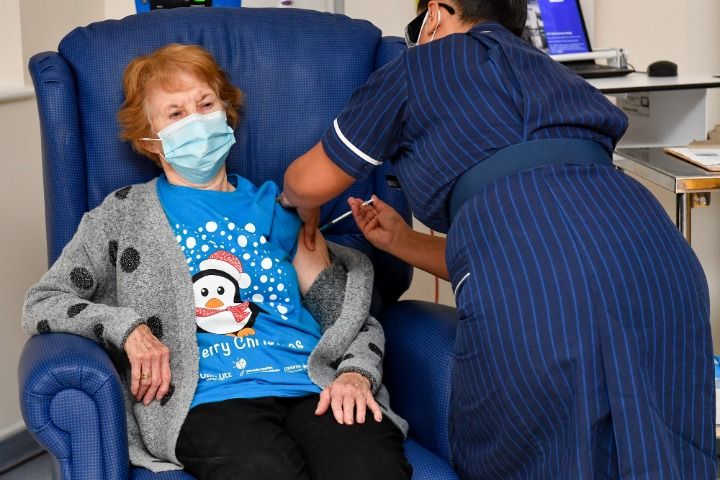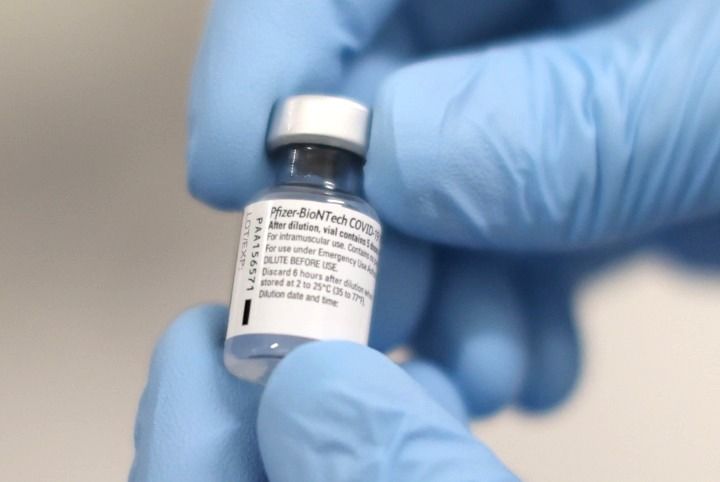December 10 The United Kingdom began to be vaccinated against a coronavirus vaccine on a large scale on the 8th, and some people have had allergic reactions. Officials of the British drug regulatory agency warned on the 9th that people who have had “significant” allergic reactions to drugs, food or vaccines should not be vaccinated against this vaccine.
Canadian health regulators approved the use of the coronavirus vaccine developed by the German biotechnology company Pfizer Pharmaceuticals of the United States on the 9th, saying that it will pay attention to allergy cases in the United Kingdom. A senior U.S. government official in charge of vaccine affairs said that U.S. regulators will take into account the allergy situation in the United Kingdom when reviewing the vaccine.

UK issued tips
The British Drug and Health Products Administration said on the 9th that since the large-scale vaccination of the coronavirus vaccine jointly developed by Virtue, there have been two severe allergic reactions and one suspected allergic reaction. The agency immediately prompted that anyone who had a significant allergic reaction to a vaccine, drug or food should not be vaccinated.
Severe allergic reactions include swollen throat, difficulty breathing, and swallowing. They are an overreaction of the body’s immune system and can even threaten lives.
Joan Reyn, CEO of the British Drug and Health Products Agency, said: “Most people do not have allergic reactions [due to vaccination]. Vaccination can protect people from the novel coronavirus. This advantage is greater than the risk of vaccination u2026u2026 You can rest assured that this vaccine is in line with the drug. “Quality and Health Products Administration’s Standards for the Safety, Quality and Effectiveness of Vaccines.”
Pfizer and Biotech did not test people with a history of severe allergy when they conducted the last phase of the clinical trial of the vaccine, Reuters reported. The two companies said they would cooperate with the British Drug and Health Products Agency’s investigation.

Experts have different opinions.
Experts differ on the coronavirus vaccination tips issued by the British Drug and Health Products Administration.
Peter Oppenshaw, professor of experimental medicine at Imperial College of Technology, acknowledged the practice of British regulators. “We quickly learned about these two cases of allergy, and the regulator has issued preventive reminders on this, which indicate that the monitoring system is working well.”
But Mitchell Grayson, director of the Allergy and Immunizations Unit at the National Children’s Hospital in Columbus, Ohio, believes that the UK’s issuance of vaccination tips may affect the public’s willingness to get the coronavirus vaccine. “I’m worried that this will make millions of people choose not to vaccinated”.
Gregory Pollan, virologist and director of vaccine research at the Mayo Clinic in the United States, believes that the British side does not recommend people with a history of food allergy to vaccinate against the novel coronavirus, which is “overreactive”. Pollan advises U.S. health regulators.
The United States and Canada expressed caution
The U.S. Food and Drug Administration confirmed on the 8th that the agency’s Advisory Committee on Vaccines and Related Biological Products is scheduled to meet on the 10th to discuss the approval of the release of the vaccine jointly developed by Virtue in the United States.
DA documents show that 0.63% of people who inject this vaccine have suspected allergic reactions during the clinical trial stage; 0.51% of the reference group, that is, people who have been injected with placebo, 0.51% of suspected allergic reactions.
Monsef Slavey, chief adviser of Operation Warp, a U.S. coronavirus vaccine and drug solution plan, said on the 9th that he expected that U.S. regulators would take into account vaccine allergy cases in the United Kingdom when reviewing the vaccine jointly developed by Virtue.
Sravi advised those with a history of severe allergies not to get the vaccine until the relevant investigation is completed.
Health Canada approved the use of this vaccine on the 9th. Health Canada said it would pay attention to the adverse effects of vaccination reported in the United Kingdom, but this situation was expected and did not necessarily change the assessment of the advantages and disadvantages of vaccination.



